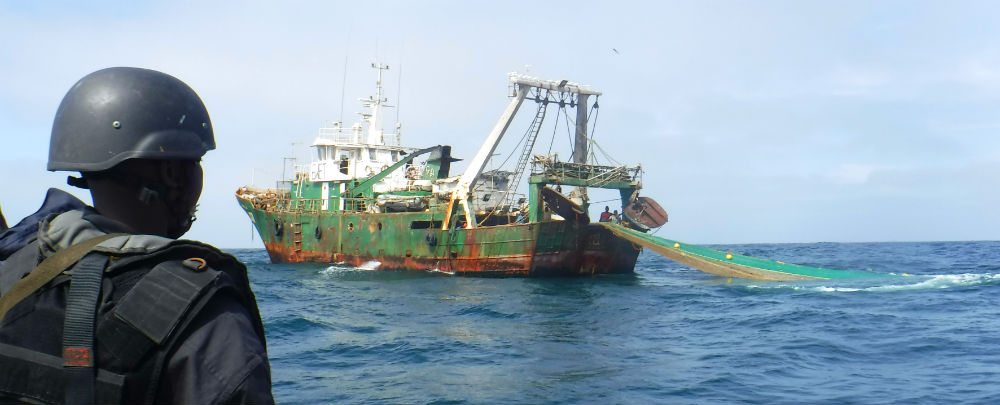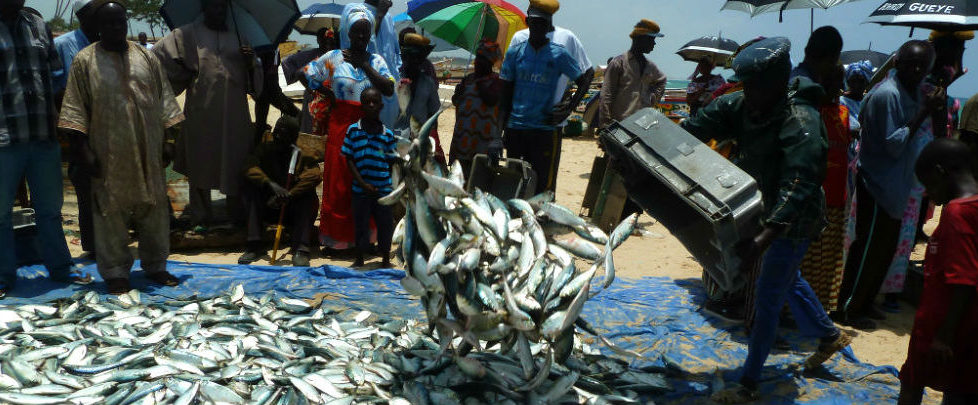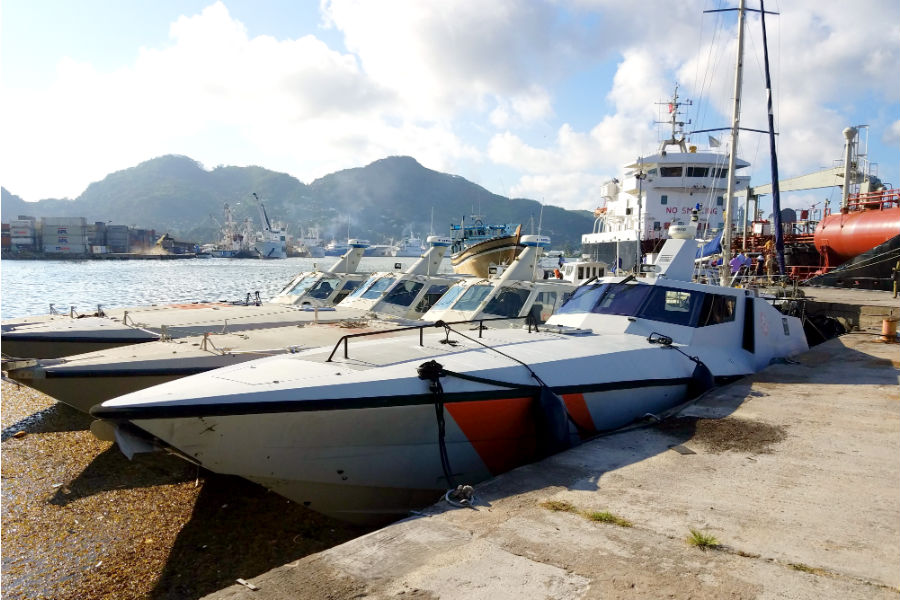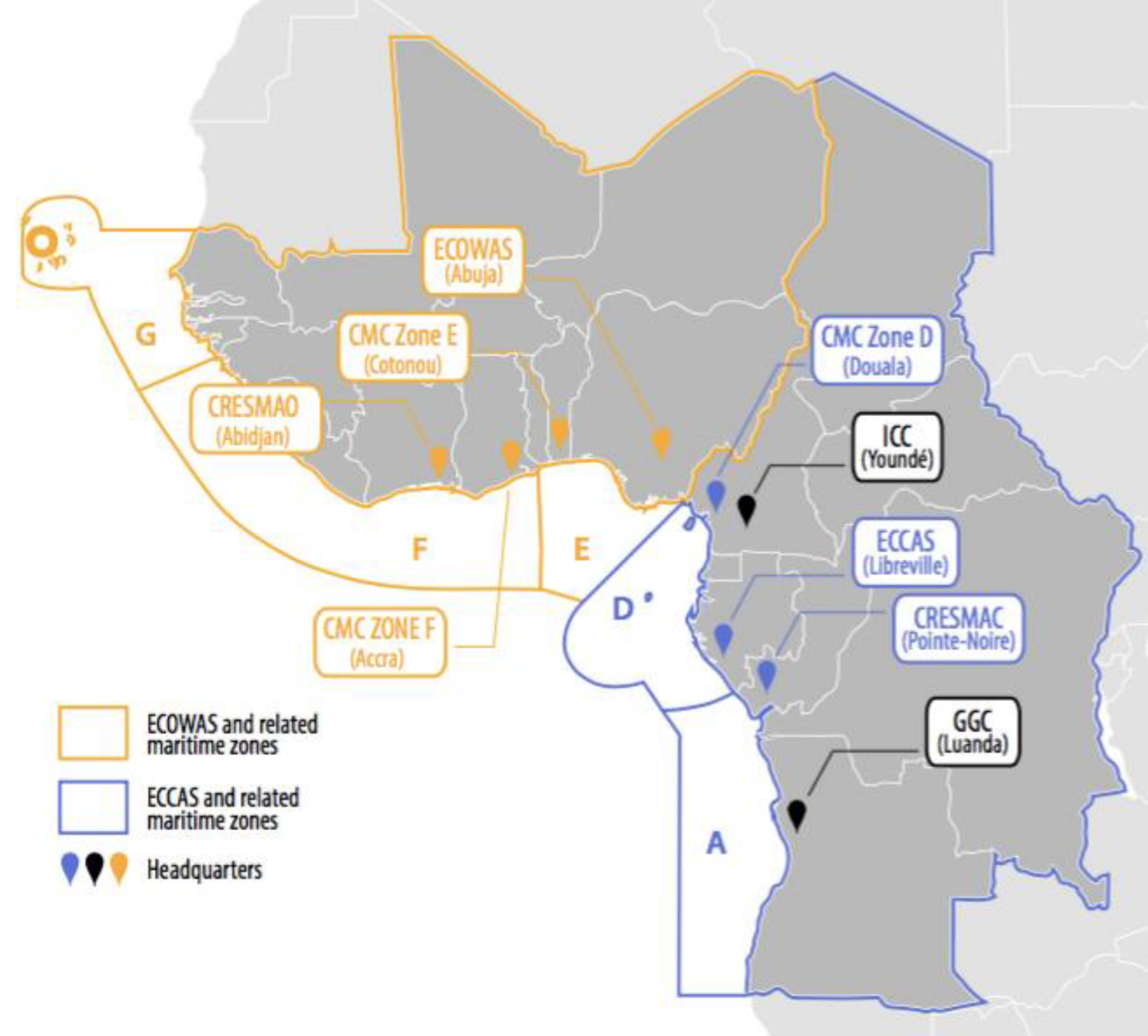
More than 90 percent of the world’s trade travels by sea. Submarine cables transmit 95 percent of telecommunications data and roughly $10 trillion per day. Cutting one group of such cables could black out a third of the world’s Internet. The maritime smuggling of drugs, oil, antiquities, charcoal, ivory, and other goods facilitates transnational criminal networks and funds terrorist groups. Weapons trafficking fuels conflicts around the globe, and with more private armed activity at sea, the line between state and non-state action is blurring when it comes to maritime security.
Life as we know it today depends heavily on the maritime environment, and thus, maritime security is an integral albeit often invisible safeguard to our modern way of life. An array of maritime threats poses serious challenges to fundamental aspects of our interconnected global community. Dr. Ian Ralby, formerly the Africa Center’s faculty lead for maritime law and security, discusses the significance of emerging maritime security trends in Africa and key developments in adapting to evolving threats.
Why is the maritime domain so important to Africa?
In Africa, as in the rest of the world, the maritime domain is the lifeblood of the economy and, in many cases, central to both food security and food sovereignty. We often use the expression “no shipping, no shopping” to emphasize the impact that maritime commerce has on our way of life. Given the incredible volume of trade that occurs by sea, that expression is true for every country around the world—whether littoral or landlocked.
Beyond what comes into African ports, a tremendous amount is exported as well. Historically, those exports have been primarily raw materials—gold, diamond, minerals, fish, cotton, cocoa, timber, and other agricultural and extractive goods. As manufacturing and exportable craftsmanship sectors expand, the export of finished goods is on the rise. Access to safe, secure maritime transit routes will be vital to the successful integration of those products into the global marketplace. Economically, therefore, the maritime domain is central to Africa’s development and prosperity.

Fresh fish in Kayar, Senegal.
In Africa—more than in other parts of the world—fish constitute a major source of food. In some countries, 90 percent of dietary protein comes from fish. That means that, beyond the economic importance of the maritime domain, some African countries rely on marine fisheries for the physical survival of their populations. Any interruptions in access to fish constitutes a threat to food security in these countries. Similarly, if a country’s fisheries sustain environmental damage from dumping or overfishing, the country loses food sovereignty—control over its national food supply. So the maritime domain in Africa is simultaneously crucial to the economy, food security, and food sovereignty.
What are the greatest emerging maritime threats facing Africa?
Piracy remains a serious issue continent-wide. While many think piracy off the coast of Somalia continues, others think it has been defeated. Both narratives are wrong. Piracy is a land-based problem with maritime symptoms, and although the symptoms have changed, the problems remain. Whether it is charcoal smuggling, arms trafficking, or attacks against vessels engaged in other illicit activity, many of the actors who perpetrated piracy a decade ago remain engaged in maritime crime. Added to those challenges, insecurity in Yemen has led to a remarkable degree of criminal innovation in the Red Sea, including remote-controlled bomb boats posing a threat to commerce and unmanned submersibles threatening maritime infrastructure. These developments have implications for the entire region.
In many respects, wealth blindness and its implications constitute one of the biggest threats to the African maritime domain.
In addition to those dynamics, African countries will continue to face both criminal and legitimate efforts to take advantage of their marine resources. Many countries in Africa have done well to overcome sea blindness—the phenomenon of ignoring the maritime domain—but many continue to suffer from maritime wealth blindness. In other words, they know there is value in the maritime space, but they do not know how much it is worth or what could be done to enhance it. Governments will have to stand up more aggressively to those who seek to steal fish, sand, minerals, and other resources. At the same time, however, seemingly legitimate actors will seek to take advantage of African wealth blindness and attempt to “negotiate” deals that harm African states and benefit foreign entities. So in many respects, wealth blindness and its implications constitute one of the biggest threats to the African maritime domain.
In the East and Indian Ocean island states, the movement of heroin over water has increased dramatically in recent years and threatens to strengthen transnational criminal networks while incapacitating significant portions of the working-age population of those countries.
In the North, migrant smuggling across the Mediterranean Sea has caught international attention and constitutes a serious challenge. At the same time, coastal fuel smuggling is rampant and serving as a major funding source for illicit and terrorist networks. This will likely be a problem for years to come.
In West and Central Africa, a diversity of challenges from piracy and armed robbery at sea to illicit oil and fuel activities, trafficking of all sorts, smuggling of various goods and various environmental crimes threaten the safety, security, and sustainability of the maritime space. As near-shore law enforcement improves, attacks are becoming more brazen and occurring farther out to sea, leading to higher ransom demands to account for the riskier activities. Success on the part of coastal states in the Gulf of Guinea is therefore producing new challenges that will test the region’s resilience and adaptability.
The “architecture” of maritime security in Africa has developed a lot in the last ten years. How does it look today and where is it heading?

Gunboats in the Seychelles.
It is truly remarkable how quickly the architecture of maritime security is developing in Africa. Over the last decade, the efforts at generating maritime security cooperation between governments and between regions have produced an increasingly clear picture of what a whole-of-Africa approach to maritime security would look like. While much of North Africa cooperates with Southern Europe through the 5+5 Defense Initiative, the Djibouti and Yaoundé Codes of Conduct are the main pillars of maritime security cooperation for the rest of the continent. Launched in 2009, the Djibouti Code brought together several states from the Arabian Peninsula along with all the states of Eastern, Southern and Indian Ocean Africa—from Egypt to South Africa—to cooperate in the fight against piracy.
Taking inspiration from that initiative and confronting their own problem of piracy, the states of the wider Gulf of Guinea—from Senegal to Angola—formed the Yaoundé Code in 2013. But the Yaoundé Code sought cooperation on all forms of maritime crime, from piracy to trafficking to oil theft to illegal fishing. Furthermore, it took advantage of the maritime zones established by ECOWAS and ECCAS such that there is now a very clear cascading set of institutions covering not only the coastal states of the two regions, but the landlocked states as well.
The Yaoundé Code of Conduct is grounded in the 26 signatory states, and their national efforts to develop interagency processes and national maritime strategies have been laudable. Those states are grouped into Zones, each of which has a Regional Center for Operational Cooperation that coordinates among the Zones and individual states. So CRESMAC in Central Africa covers Zones A and D, and CRESMAO in West Africa covers Zones E, F, and G. At the apex is the Inter-Regional Coordination Center, often referred to by its French acronym, CIC, based in Yaoundé, Cameroon. Now nearly six years old, this architecture continues to be operationalized and is producing results on the water, though there remains a lot of work to do.

ICC and CMC Gulf of Guinea outline with ECOWAS, ECCAS, and related maritime zones.
Inspired by both the architecture of the Gulf of Guinea region and some of its successes, and recognizing the multifaceted nature of maritime threats, the Djibouti Code states reassembled in January 2017 to produce the Jeddah Amendments, extending the cooperative regime to the full spectrum of maritime crimes. The architecture in the East is not as clearly defined as in the Gulf of Guinea, but cooperative mechanisms are beginning to take hold, particularly in the states of the Indian Ocean Commission, which have set up a Regional Center for Operational Coordination and a Regional Information Fusion Center in Madagascar. The MASE Program funded by the European Union is helping bring the Indian Ocean island states and East African coastal states together, suggesting that an architecture similar to the Gulf of Guinea rests on the horizon.
Interestingly, Namibia is the only coastal state in Africa that is not part of the Djibouti Code, the Yaoundé Code, or the 5+5. Additionally, Morocco’s request to join the Yaoundé Code has sparked thinking about what Safety and Security in Atlantic Africa (S2A2) might look like as the next generation of the Yaoundé architecture, potentially spanning the entire Atlantic seaboard.
While some have been critical of the pace of some institutions, it is important to remember that a decade ago, there was no discernable maritime security architecture of any kind throughout most of Africa. Accordingly, the cooperation regimes and concrete examples of success—like ECCAS Zone D (Cameroon, Equatorial Guinea, Gabon, and São Tomé and Príncipe), which successfully conducts combined operations at sea virtually every day of the year—are inspirational, not only within Africa, but around the world.
What needs to happen to build on the regional and sub-regional efforts in order to accomplish the AIMS 2050 vision for maritime security, governance and development throughout Africa? What role does the African Union have and what role do the Regional Economic Communities (RECs) have in this process?
There is an inextricable link between maritime security, maritime governance, and the maritime economy.
The African Union may “own” the Africa Integrated Maritime Strategy 2050, but if it wants to ever see that strategy implemented, it is going to have to demonstrate some real commitment to Africa’s maritime domain. There is tremendously positive work happening at the national, zonal, regional, and inter-regional levels. But the AU has not yet shown the interest in actually pulling all that effort together to form a whole-of-Africa approach to maritime security. While the recent restructuring of relevant AU committees has carved out the blue economy as a focus, that still does not translate into addressing other maritime needs. As many African governments have found, there is an inextricable link between maritime security, maritime governance, and the maritime economy. The blue economy is the sustainable, inclusive, and environmentally friendly output of these efforts. For the AU to take on implementation of the AIMS 2050, it must ensure strategic-level expertise regarding all three of these pillars to work with the RECs to make sure that maritime safety, security, governance, and development becomes a reality around the continent.
The RECs, however, cannot wait for the AU—and many of them are not. The problem is the inconsistency between them. More effort is needed to create inter-regional cooperation on maritime security. The RECs, moreover, need to work to promote the commerce of ideas flowing around Africa so that lessons from one region can be shared with another. Some of the most dynamic approaches to solving maritime security problems worldwide can be found in Africa. So the RECs should focus on fostering Africa-to-Africa capacity building. Furthermore, as wealth blindness poses a threat to the entire continent, the RECs should work to help their member states conduct the scientific and economic studies needed to understand both the value of their maritime domains and the potential for enhancing that value further in a sustainable and responsible manner.
What priorities do you see for maritime security efforts moving forward?
In many ways, the top priority in Africa is to keep up the momentum. So much has happened in the last decade and there is now a lot of experience and expertise on a wide range of matters around the continent. Increasingly, it is evident that one of the most effective ways of inspiring African states to take new approaches to securing, governing, and developing the maritime space is to see those approaches working in other parts of the continent. Thus, identifying and sharing success stories and lessons around Africa should be a priority. This is the driving concept behind the Africa Center’s annual Whole-of-Africa Maritime Dialogue, the next of which will be held in Windhoek, Namibia, in May
The time has come to focus on deconflicting and coordinating the various portions of the maritime security architecture around the continent.
Recognizing both new threats and threats that have not been addressed is extremely important. For example, environmental crimes have not been a major focus of the last decade. Oil and fuel theft, illegal dumping and discharge, and illegal ship-to-ship transfers are occurring daily without the permission of coastal states and are, particularly when oil is spilled, harming the marine environment, as well as eroding the rule of law.
Finally, with the proliferation of instruments and institutions over the last decade, the time has come to focus on deconflicting and coordinating the various portions of the maritime security architecture around the continent. By taking stock of where things stand, African governments can determine what needs to be done to resolve gaps and redundancies that undercut the functionality of the myriad initiatives. Furthermore, doing so can help African governments and cooperative institutions prepare to take on greater challenges as criminals respond to improved maritime law enforcement.
Additional Resources
- Africa Center for Strategic Studies, “Innovating Security Solutions on the Seas in the Seychelles,” Spotlight, AMay 25, 2018.
- Africa Center for Strategic Studies, “Enhancing Maritime Security in Africa,” program materials, March 2018.
- André Standing, “Criminality in Africa’s Fishing Industry: A Threat to Human Security,” Africa Security Brief No. 33, Africa Center for Strategic Studies, June 6, 2017.
- Africa Center for Strategic Studies, “Maritime Safety and Security: Crucial for Africa’s Strategic Future,” Spotlight, March 4, 2016.
- Adeniyi Adejimi Osinowo, “Combating Piracy in the Gulf of Guinea,” Africa Security Brief No. 30, Africa Center for Strategic Studies, February 28, 2015.
- Augustus Vogel, “Investing in Science and Technology to Meet Africa’s Maritime Security Challenges,” Africa Security Brief No. 10, Africa Center for Strategic Studies, February 28, 2011.
- Augustus Vogel, “Navies and Coast Guards: Defining the Roles of Africa’s Maritime Security Forces,” Africa Security Brief No. 2, Africa Center for Strategic Studies, December 31, 2009.
More on: Maritime Security

